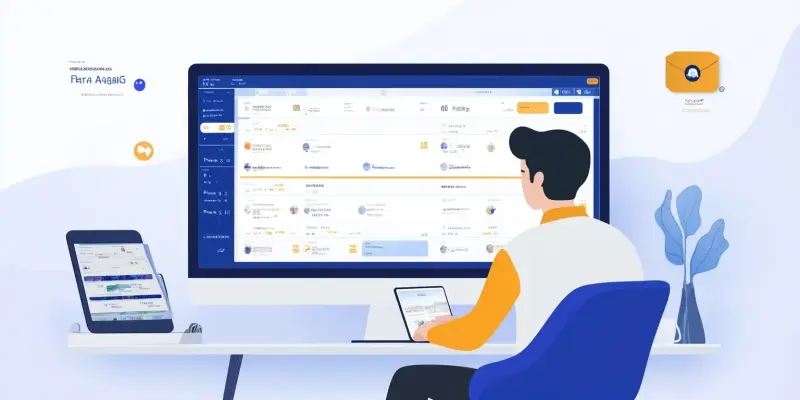As thousands of businesses face the impending end-of-life for Microsoft Dynamics GP in 2029, the need for experienced ERP consultants is surging, particularly around ERP migration projects. Many organizations are grappling with the best approach to bridge resource gaps in their ERP teams. Should they hire a full-time ERP expert, or is it more beneficial to contract an ERP consultant to meet immediate demands?This crucial decision impacts not only the immediate implementation of projects but also the long-term success of the organization’s ERP strategy. With transitions to newer systems like Acumatica, D365, or Sage Intacct on the horizon, businesses must weigh the benefits and potential drawbacks of each option carefully.
Advantages of Hiring an ERP Consultant
Hiring an ERP consultant on a contract basis offers several key advantages, particularly in the context of ERP migration and other complex projects.One of the primary benefits is the quick access to specialized knowledge that consultants bring to the table. They provide expertise that may not be available in-house, allowing organizations to tackle intricate ERP tasks with greater efficiency.This specialized support can lead to prompt completion of projects, avoiding delays that can be costly and disruptive.
Additionally, ERP consultants offer flexibility by eliminating the need for long-term commitments. Organizations can engage consultants on an as-needed basis, ensuring that resources are allocated only when there is a specific requirement.This approach allows companies to manage their budgets more effectively, paying for expert knowledge only when necessary. Moreover, consultants often bring a fresh perspective to the table, identifying inefficiencies and recommending improvements that internal teams may overlook. For example, an ERP consultant once drastically reduced import times for a manufacturer using Acumatica by 90%, showcasing the substantial impact such expertise can have on operational efficiency.
However, it is important to consider that contractors may lack a deep understanding of the company’s culture and internal dynamics. This disconnect can sometimes lead to challenges in fully integrating their recommendations with existing processes. Additionally, because consultants are only engaged for specific projects, they may not be available for long-term follow-ups or support, potentially hindering the ongoing development of in-house capabilities.
Benefits of Hiring a Full-Time ERP Expert
On the other hand, hiring a full-time ERP expert brings its own set of advantages, particularly in terms of long-term stability and continuity.Full-time employees are more likely to be deeply integrated into the organizational culture, understanding the company’s unique needs and strategic goals. This in-depth familiarity can be invaluable when implementing and maintaining ERP systems, ensuring that solutions are tailored to the specific context of the business.Full-time ERP experts also provide a level of continuity and ongoing support that contractors may not be able to match. They are available to address issues as they arise, offering dedicated support and maintenance over the long term. This ongoing presence can help prevent the knowledge gaps and service interruptions that might occur when relying solely on external consultants. Additionally, full-time employees can contribute to the development and training of the internal team, helping to build valuable in-house expertise that can be leveraged across multiple projects.
A notable trade-off, however, is the higher cost associated with hiring full-time employees. Organizations must consider the financial implications of salaries, benefits, and other employment-related expenses. Furthermore, finding the right candidate for a full-time position can be time-consuming, and there is always the risk that the individual may not be a perfect fit for the company’s requirements. In dynamic environments where project needs can change rapidly, the inflexibility associated with full-time hires might also pose a challenge.
Balancing the Two Approaches
To optimize their ERP strategy, companies must weigh the advantages and trade-offs of both approaches and identify the right balance between hiring full-time ERP professionals and engaging consultants. Each organization’s specific needs, budget constraints, and long-term goals will influence this decision.One potential strategy is to use ERP consultants to address immediate, specialized needs while simultaneously building a robust in-house team for long-term support. This mixed approach allows companies to leverage the strengths of both options, ensuring that projects are completed efficiently and that there is continuity and stability in maintaining the ERP system over time. By engaging consultants for specific projects, businesses can benefit from their specialized knowledge without committing to long-term contracts. Meanwhile, investing in the development of a full-time team ensures that the organization retains essential ERP expertise in-house, promoting sustainable growth and continuous improvement.
The upcoming What’s the Buzz Monthly Chat hosted by The ISV Society will delve deeper into this topic, providing practical insights and real-world examples to help companies navigate these decisions. Industry experts will discuss various aspects of ERP talent strategies, including cost implications, risks, and best practices for balancing the engagement of full-time hires and consultants.This session aims to empower attendees with the information needed to make well-informed decisions about their ERP resource planning.
Strategic Decision-Making for ERP Resource Planning
As thousands of businesses prepare for the upcoming end-of-life for Microsoft Dynamics GP in 2029, there’s a rising demand for seasoned ERP consultants, particularly for ERP migration projects. Organizations are finding themselves at a crossroads: Should they hire a full-time ERP expert, or would it be more advantageous to bring on a contracted ERP consultant to address immediate needs?This critical choice influences not only the prompt execution of projects but also the long-term success of the company’s ERP strategy. With transitions to new systems like Acumatica, D365, or Sage Intacct imminent, it’s essential for businesses to meticulously assess the advantages and possible drawbacks of each option.Beyond ensuring smooth migrations, the right decision will help align the company’s technological upgrades with its broader business goals, thus positioning it for future success in an increasingly competitive market.

